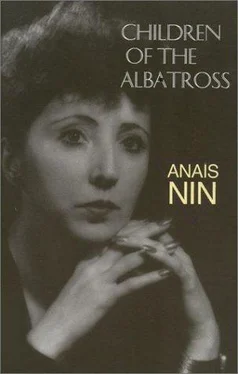Anaïs Nin - Children of the Albatross
Здесь есть возможность читать онлайн «Anaïs Nin - Children of the Albatross» весь текст электронной книги совершенно бесплатно (целиком полную версию без сокращений). В некоторых случаях можно слушать аудио, скачать через торрент в формате fb2 и присутствует краткое содержание. Год выпуска: 1959, ISBN: 1959, Издательство: Swallow Press, Жанр: Классическая проза, Эротические любовные романы, на английском языке. Описание произведения, (предисловие) а так же отзывы посетителей доступны на портале библиотеки ЛибКат.
- Название:Children of the Albatross
- Автор:
- Издательство:Swallow Press
- Жанр:
- Год:1959
- ISBN:9780804000390
- Рейтинг книги:4 / 5. Голосов: 1
-
Избранное:Добавить в избранное
- Отзывы:
-
Ваша оценка:
- 80
- 1
- 2
- 3
- 4
- 5
Children of the Albatross: краткое содержание, описание и аннотация
Предлагаем к чтению аннотацию, описание, краткое содержание или предисловие (зависит от того, что написал сам автор книги «Children of the Albatross»). Если вы не нашли необходимую информацию о книге — напишите в комментариях, мы постараемся отыскать её.
Children of the Albatross — читать онлайн бесплатно полную книгу (весь текст) целиком
Ниже представлен текст книги, разбитый по страницам. Система сохранения места последней прочитанной страницы, позволяет с удобством читать онлайн бесплатно книгу «Children of the Albatross», без необходимости каждый раз заново искать на чём Вы остановились. Поставьте закладку, и сможете в любой момент перейти на страницу, на которой закончили чтение.
Интервал:
Закладка:
He suspected that some day an honest woman would clear all this away. He never suspected for a moment that this mystery was a part of themselves they did not know, could not see.
Djuna, he ruminated, was a more ornamented woman, but an honest one.
He had long ago found a way to neutralize the potencies of woman by a simplification all his own, which was to consider all women as sharing but one kind of hunger, a hunger situated between the two pale columns of the legs. Even the angels, said Jay, even the angels, and the mothers, and the sisters, were all made the same way, and he retained this focus upon them from the time when he was a very little boy playing on the floor of his mother’s kitchen and an enormous German woman had come straight to them from the immigration landing, still wearing her voluminous peasant skirts, her native costume, and she had stood in the kitchen asking his mother to help her find work, using some broken jargon impossible to understand—everyone in the house dismayed by her foreignness, her braids, her speech. As if to prove her capabilities through some universal gesture, she had started to knead the dough expertly, kneading with fervor, while Jay’s mother watched her with increasing interest.
Jay was playing on the floor with matches, unnoticed, and he found himself covered as by a huge and colorful tent by the perfoliate skirt of the German woman, his glance lost where two pale columns converged in a revelation which had given him forever this perspective of woman’s be, this vantage point of insight, this observatory and infallible focus, which prevented him from losing his orientation in the vastest maze of costumes, classes, races, nationalities—no external variations able to deprive him of this intimate knowledge of woman’s most secret architecture…
Chuckling, he thought of Djuna’s expression whenever she opened the door to receive him.
The dreamer wears fur and velvet blinkers.
Chuckling, Jay thought of himself entering the house, and of her face shining between these blinkers of her vision of him as a great painter, shutting out with royal indifference all other elements which might disturb this vision.
He could see on her face this little shrine built by the dreamer in which she placed him as a great painter. Won by her fervor, he would enter with her into her dream of him, and begin to listen raptly to her way of transmuting into gold everything he told her!
If he had stolen from the Zombie’s pocketbook she said it was because the Zombie was provocatively miserly. If he complained that he was oversleeping when he should be working Djuna translated it that he was catching up on sleep lost during the period when he had only a moving-picture hall to sleep in.
She only heard and saw what she wanted to hear and see. (Damn women!) Her expression of expectancy, of faith, her perpetual absolution of his acts disconcerted him at times.
The more intently he believed all she believed while he was with her, the more precipitately he fell out of grace when he left her, because he felt she was the depository of his own dream, and that she would keep it while he turned his back on it.
One of the few women, chuckled Jay, who understood the artificial paradise of art, the language of man.
As he walked, the city took on the languid beauty of a woman, which was the beauty of Paris, especially at five o’clock, at twilight, when the fountains, the parks, the soft lighting, the humid streets like blue mirrors, all dissolved into a haze of pearl, extending their fripperies and coquetries.
At the same hour New York took on its masculine and aggressive beauty, with its brash lighting, its steel arrows and giant obelisks piercing the sky, an electric erectness, a rigid city pitiless to lovers, sending detectives to hotel rooms to track them down, at the same hour that the French waiter said to the couples: do you wish a cabinet particulier —atthe same hour that in New York all the energies were poured into steel structures, digging oil wells, harnessing electricity, for power.
Jay walked leisurely, like a ragpicker of good moments, walked through streets of joy, throwing off whatever disturbed him, gathering only what pleased him, noticing with delight that the washed and faded blue of the cafe awning matched the washed faded blue face of the clock in the church spire.
Then he saw the cafe table where Lillian sat talking with Sabina, and knowing his dream of becoming a great painter securely stored in the eyes of Djuna (damn women!) he decided to sin against it by sinking into the more shallow fantasies born of absinthe.
Djuna awakened from so deep a dream that opening her eyes was like pushing aside a heavy shroud of veils, a thousand layers of veils, and with a sensation similar to that of the trapezist who has been swinging in vast spaces, and suddenly feels again in his two hands the coarse touch of the swing cord.
She awakened fully to the painful knowledge that this was a day when she would be possessed by a mood which cut her off from fraternity.
It was also at those moments that she would have the clearest intuitions, sudden contacts with the deepest selves of others, divine the most hidden sorrow.
But if she spoke from this source, others would feel uneasy, not recognizing the truth of what she said. They always felt exposed and were quick to revenge themselves. They rushed to defend this exposure of the self they did not know, they were not familiar with, or did not like. They blamed her for excess of imagination, for exaggeration.
They persisted in living on familiar terms only with the surface of their personalities, and what she reached lay deeper where they could not see it. They feltat ease among their falsities, and the nakedness of her insight seemed like forcing open underworlds whose entrance was tacitly barred in everyday intercourse.
They would accuse her of living in a world of illusion while they lived in reality.
Their falsities had such an air of solidity, entirely supported by the palpable.
But she felt that on the contrary, she had contact with their secret desires, secret fears, secret intents. And she had faith in what she saw.
She attributed all her difficulties merely to the over quickness of her rhythm. Proofs would always follow later, too late to be of value to her human life, but not too late to be added to this city of the interior she was constructing, to which none had access.
Yet she was never surprised when people betrayed the self she saw, which was the maximum rendition of themselves. This maximum she knew to be a torment, this knowledge of all one might achieve, become, was a threat to human joy and life. She felt in sympathy with those who turned their back on it. Yet she also knew that if they did, another torment awaited them: that of having fallen short of their own dream.
She would have liked to escape from her own demands upon herself.
But even if at times she was taken with a desire to become blind, to drift, to abandon her dreams, to slip into negation, destruction, she carried in herself something which altered the atmosphere she sought and which proved stronger than the place or people she had permitted to infect her with their disintegration, their betrayal of their original dream of themselves.
Even when she let herself be poisoned with all that was human, defeat, jealousy, sickness, surrender, blindness, she carried an essence which was like a counter-poison and which reversed despair into hope, bitterness into faith, abortions into births, weight into lightness.
Everything in her hands changed substance, quality, form, intent.
Djuna could see it happen against her will, and did not know why it happened.
Was it because she began every day anew as children do, without memory of defeat, rancor, without memory of disaster? No matter what happened the day before, she always awakened with an expectation of a miracle. Her hands always appeared first from out of the sheets, hands without memories, wounds, weights, and these hands danced.
Читать дальшеИнтервал:
Закладка:
Похожие книги на «Children of the Albatross»
Представляем Вашему вниманию похожие книги на «Children of the Albatross» списком для выбора. Мы отобрали схожую по названию и смыслу литературу в надежде предоставить читателям больше вариантов отыскать новые, интересные, ещё непрочитанные произведения.
Обсуждение, отзывы о книге «Children of the Albatross» и просто собственные мнения читателей. Оставьте ваши комментарии, напишите, что Вы думаете о произведении, его смысле или главных героях. Укажите что конкретно понравилось, а что нет, и почему Вы так считаете.












